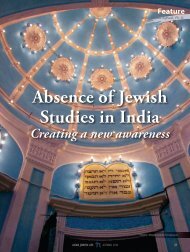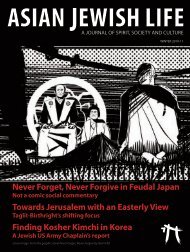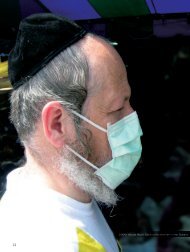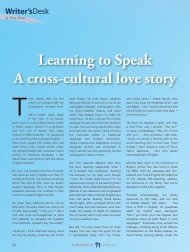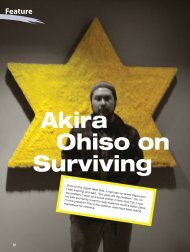Download PDFs of all articles - Asian Jewish Life
Download PDFs of all articles - Asian Jewish Life
Download PDFs of all articles - Asian Jewish Life
- No tags were found...
You also want an ePaper? Increase the reach of your titles
YUMPU automatically turns print PDFs into web optimized ePapers that Google loves.
ExpatDiaryby Aimee WeinsteinExperiencing the Exodus(from Japan)“May <strong>all</strong> who are hungry comeand eat with us.” As Jewswe say these words fromthe traditional Haggadahduring the first two nights<strong>of</strong> Passover every year,but this year, they rangespeci<strong>all</strong>y true for meand my family as wemuddled through theevents surroundingthe Japan earthquakeand subsequent tsunami.By the time Passover camealong over a month later, we weregrateful for the chance to celebrate.Though I am an American I live in Tokyo, Japanwith my husband and two children. We have been herefor quite a long time – six <strong>of</strong> the past eight years, and were<strong>all</strong>y do consider it home. The kids attend an internationalschool that attracts children from <strong>all</strong> over the world. We asforeigners are a part <strong>of</strong> the landscape, but we remain external– not directly part <strong>of</strong> the culture. Japan is a homogeneoussociety and while foreigners are welcome, it is not easy toblend in. Like the Jews <strong>of</strong> yore creating their shtetls, we live ina “gai-jin ghetto” – a ghetto for foreigners.That being said, Tokyo is still an easy city in which to live asa foreigner. We joke that living in central Tokyo like we do, isjust like living in Manhattan, only it’s clean, safe, and quiet.Orderliness is a part <strong>of</strong> the Japanese ethos. On escalators,everyone stands on the right side, with room on the left forpassing. No one jaywalks and even though there are no trashcans visible on the sidewalks, there’s never any trash either.Japanese people follow rules.Then, the big earthquake hit. At first, panic. But the Japanesepeople are calm by nature – unflappable, so we went withit. In the immediate aftermath, life didn’t seem so abnormal.Sure, my son’s basketb<strong>all</strong> practice wascancelled, as was the kids’ Sundayschool, and our pre-Purim party,but soccer practice went onas normal. We met friends toplay in the park and go out forlunch to a favorite restaurant. Thesun shone and it was nearly 60degrees <strong>all</strong> weekend. However,we were rolling with theaftershocks; wewaited on thegas lines; and weshopped earlyin the day sowe could stockup. We criedfor the people <strong>of</strong>Northern Japanand listened tothe news whenpossible.The following Tuesday morning at about 5am, there wasanother earthquake that, even though it only measured 4.0,was right under Tokyo, and felt much larger. Then we got thegrim news about the nuclear reactors. By 3pm we were on aflight to the U.S. Was it the right decision? We’ll never know;but it was the right decision for our family and we were by nomeans alone. There were hundreds <strong>of</strong> people at the airportabout to create a Japan diaspora – a diaspora <strong>of</strong> multi-nationalforeigners <strong>all</strong> displaced from Japan. The idea was dizzying.We spent the better part <strong>of</strong> five weeks watching and waiting.Will the Japanese get the nuclear situation under control?What is the real situation with radiation in the food and water?Will there be food deliveries in Tokyo? Will there be extendedblackouts in the city, and if so, will they affect our house?An entire Japan diaspora <strong>of</strong> Americans in America askedthemselves these questions.ASIAN JEWISH LIFE WINTER 2010-1129



